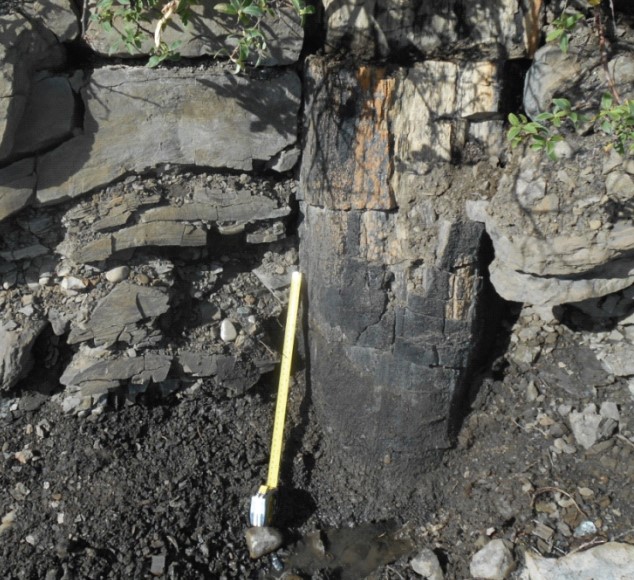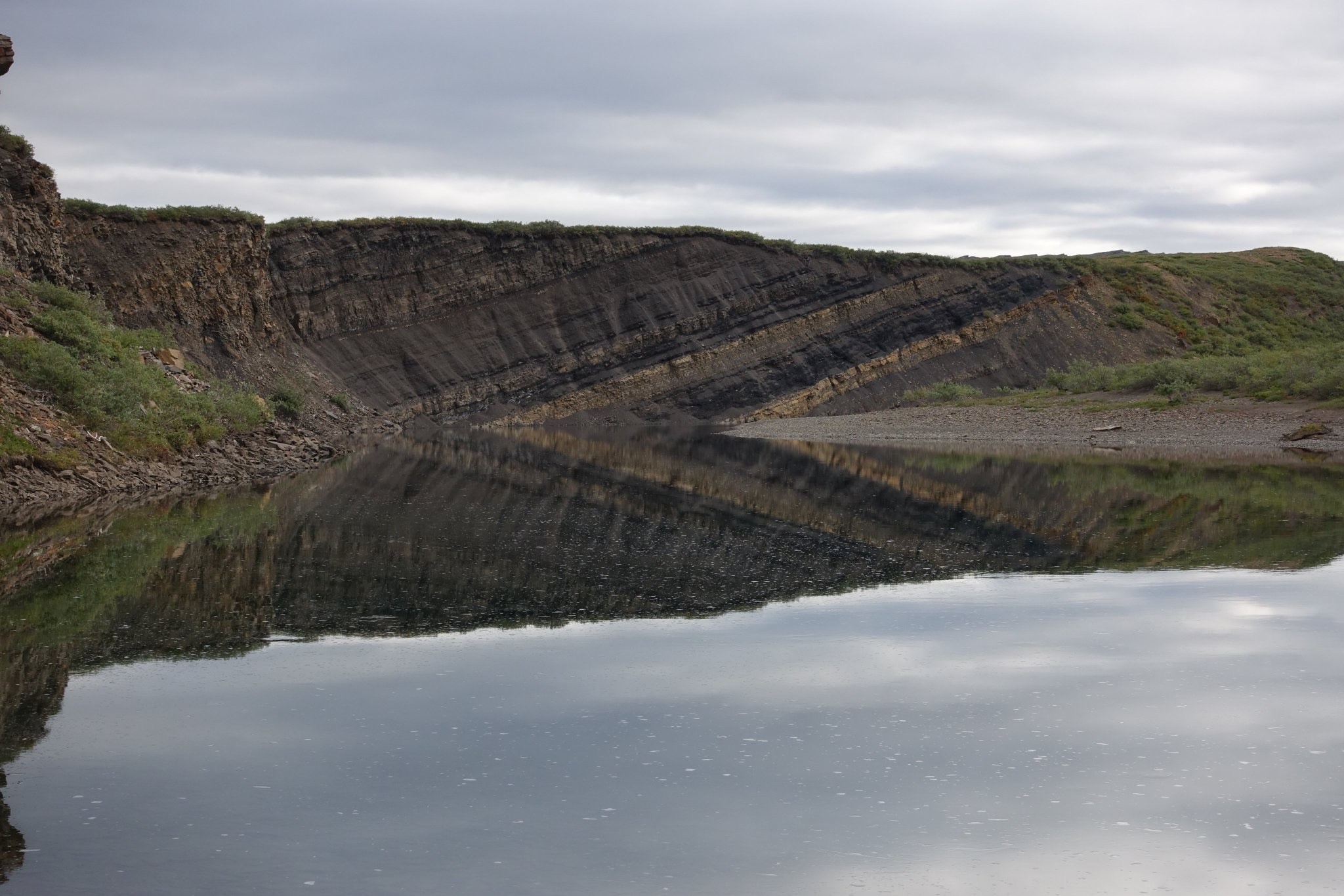Alaska dinosaur tracks reveal a lush, wet environment
Rod Boyce
907-474-7185
March 8, 2024
A large find of dinosaur tracks and fossilized plants and tree stumps in far northwestern Alaska provides new information about the climate and movement of animals near the time when they began traveling between the Asian and North American continents roughly 100 million years ago.
The findings by an international team of scientists led by paleontologist Anthony Fiorillo were published Jan. 30 in the journal Geosciences. Fiorillo researched in Alaska while at Southern Methodist University. He is now executive director of the New Mexico Museum of Natural History and Science.

A theropod track lies in rock near the west bank of the Kukpowruk River.
University of Alaska Fairbanks geology professor Paul McCarthy, with the UAF Geophysical Institute and UAF College of Natural Science and Mathematics, was a leading contributor to the research. He and UAF graduate student Eric Orphys are among the eight co-authors.
Research into the paleoclimate can help scientists understand the warming world of today, the authors write.
“The mid-Cretaceous was the hottest point in the Cretaceous,” said McCarthy, a sedimentologist and fossil soils specialist. “The Nanushuk Formation gives us a snapshot of what a high-latitude ecosystem looks like on a warmer Earth.”
The Nanushuk Formation is an outcropped layer of sedimentary rock 800 to 5,000 feet thick across the central and western North Slope. It dates to roughly 94 million to 113 million years ago in the mid-Cretaceous Period and about when the Bering Land Bridge began.

A fossilized standing tree trunk approximately 2 feet in diameter is rooted in floodplain mudstone and sandstone in the Nanushuk Formation in northwest Alaska.
The fieldwork occurred in 2015-2017 and centered on Coke Basin, a circular geologic feature of the Nanushuk Formation. The basin is in the DeLong Mountains foothills along the Kukpowruk River, about 60 miles south of Point Lay and 20 miles inland from the Chukchi Sea.
In the area, Fiorillo and McCarthy found approximately 75 fossil tracks and other indicators attributed to dinosaurs living in a riverine or delta setting.
“This place was just crazy rich with dinosaur footprints,” Fiorillo said.
One site stands out, Fiorillo said.
“We were at a spot where we eventually realized that for at least 400 yards we were walking on an ancient landscape,” he said. “On that landscape we found large upright trees with little trees in between and leaves on the ground. We had tracks on the ground and fossilized feces.”
They found numerous fossilized tree stumps, some 2 feet in diameter.
“It was just like we were walking through the woods of millions of years ago,” he said.
The Nanushuk Formation encompasses rock of marine and non-marine characteristics and composition, but the authors’ research focuses primarily on the non-marine sediments exposed along the upper Kukpowruk River.

Part of the Nanushuk Formation, visible as a darker slanted rock layer, rises in a bluff above a bend of the Kukpowruk River. The formation, which is 800 to 5,000 feet thick across the central and western North Slope of Alaska, dates to the Albian-Cenomanian Age, roughly 94 million to 113 million years ago. A large number of dinosaur tracks were found in this area.
“One of the things we did in our paper was look at the relative frequencies of the different kinds of dinosaurs,” Fiorillo said. “What was interesting to us was that the bipedal plant eaters were clearly the most abundant.”
Two-legged plant eaters accounted for 59% of the total tracks discovered. Four-legged plant eaters accounted for 17%, with birds accounting for 15% and non-avian, mostly carnivorous, bipedal dinosaurs at 9%.
“One of the things that was interesting is the relative frequency of bird tracks,” Fiorillo said.
The authors note that nearly half of North America’s shorebirds breed in the warm months of today’s Arctic. They suggest that the high number of fossil bird tracks along the Kukpowruk River indicates the warm paleoclimate was a similar driver for Cretaceous Period birds.
Of note is that the Alaska site investigated by Fiorillo and McCarthy was about 10 to 15 degrees latitude farther north in the mid-Cretaceous than it is today.
“The temperature was much warmer than it is today, and what’s possibly more interesting is that it rained a lot,” Fiorillo said. “The samples we analyzed indicate it was roughly equivalent to modern-day Miami. That’s pretty substantial.”
ADDITIONAL CONTACTS: Paul McCarthy, pjmccarthy@alaska.edu; Anthony Fiorillo, anthony.fiorillo@dca.nm.gov
157-24


